 Petzlover
Petzlover Both Kyi-Leo and Toy Australian Shepherd are originated from United States. Kyi-Leo may grow 6 cm / 2 inches shorter than Toy Australian Shepherd. Both Kyi-Leo and Toy Australian Shepherd are having almost same weight. Both Kyi-Leo and Toy Australian Shepherd has almost same life span. Both Kyi-Leo and Toy Australian Shepherd has almost same litter size. Both Kyi-Leo and Toy Australian Shepherd requires Moderate Maintenance.
Both Kyi-Leo and Toy Australian Shepherd are originated from United States. Kyi-Leo may grow 6 cm / 2 inches shorter than Toy Australian Shepherd. Both Kyi-Leo and Toy Australian Shepherd are having almost same weight. Both Kyi-Leo and Toy Australian Shepherd has almost same life span. Both Kyi-Leo and Toy Australian Shepherd has almost same litter size. Both Kyi-Leo and Toy Australian Shepherd requires Moderate Maintenance.
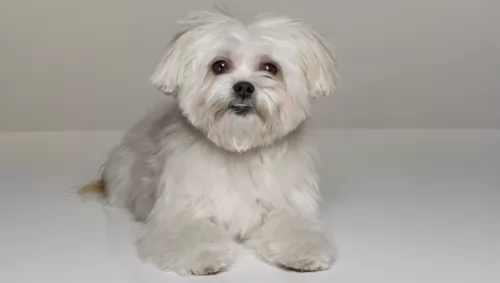 The Kyi-Leo first came about in the 1950s in San Francisco, USA, with the crossing of two dog breeds – the Lhasa Apso and the Maltese.
The Kyi-Leo first came about in the 1950s in San Francisco, USA, with the crossing of two dog breeds – the Lhasa Apso and the Maltese.
Because this is a mixed-breed dog, it isn’t recognized by the American Kennel Club, but it is recognized by some of the other dog associations such as the American Rare Breed Association or ARBA as it is known. Today the dog is looked upon as a designer breed.
 These beautiful little dogs interestingly don’t originate in Australia. They were originally bred in the western U.S. as herding dogs.
These beautiful little dogs interestingly don’t originate in Australia. They were originally bred in the western U.S. as herding dogs.
Today they are mainly companion dogs. Their lineage goes back to a pair of sibling dogs - the Wildhagen Dutchman and Fieldmaster of Flintridge and these two dogs began the lineage to which the Miniature Australian Shepherd belongs.
Known also as ‘Aussie’, there are different stories to its exact origins. It is thought that some Basque farmers brought dogs with them when they came to Australia, taking them to the United States during the 1849 California gold rush.
The dog has been crossed with a number of breeds to bring about a dog that could cope with harsh temperatures.
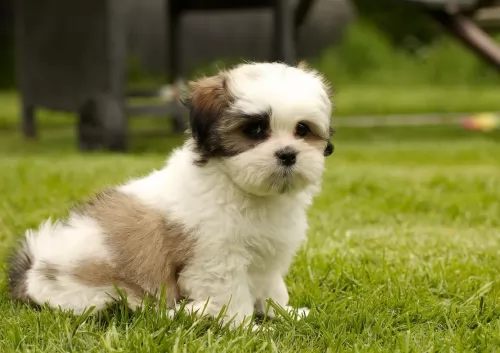 The Kyi-Leo is a small dog standing at 20 – 30cm in height and weighing in the region of 4 – 6kg.
The Kyi-Leo is a small dog standing at 20 – 30cm in height and weighing in the region of 4 – 6kg.
He has a long, silky coat which is essentially black and white or grey/silver and white or even gold and white. He has frail legs which can become injured or broken in vigorous rough and tumble games.
You can certainly describe the Kyi-Leo as a sweet, quiet, non-aggessive playful dog, and for anyone who wants a splendid pet and companion, this dog makes a great family pet and he won’t cost you an arm and a leg to feed either.
He also has an acute sense of hearing and this turns him into an excellent ‘alarm’ watch-dog. It is also a dog, that while he will love to join you on a walk, he isn’t a dog that is going to demand a lot of exercise.
He responds well to his human family, is easy-going and gentle, tending to be cautious around strangers. You can trust him to be an awesome playmate for children. In this instance, it’s the children who should be warned when playing with a dog like this as, because of his fragile build, he could easily be injured by children who haven’t been taught to respect animals.
Even though he is such an amicable pet, it will still be of benefit to you and him to have him trained and socialized. Then he responds well to basic commands such as sit, stay and lie-down.
Dogs who spend time with their family, pick up on the ‘culture’ of the family and they learn how to behave. Dogs who are left on their own and never socialized can become nervous and aggressive towards people as they never got to learn how to behave – they weren’t socialized.
 The Toy Australian Shepherd, also referred to as the Mini- or Miniature Australian Shepherd is a small dog standing at between 26 - 36 cm in height and weighing between 3 to 9kg.
The Toy Australian Shepherd, also referred to as the Mini- or Miniature Australian Shepherd is a small dog standing at between 26 - 36 cm in height and weighing between 3 to 9kg.
He has a medium-length, weather-resistant coat which is white with tan, black, red or blue merle. The coat is long, and slightly wavy with feathering around the legs and neck.
They eyes can be blue or brown or he can have two differently colored eyes.The tail of these dogs can be a natural bobtail or it is docked. They do shed but they don’t require that much grooming.
These playful little dogs may be small, but they are brave and full of courage. They’re also easy going, and love nothing more than to be around their human family.
They love the games that children play and are always ready to join in, making excellent playmates for children. Lively and alert, they also make good watchdogs and because they are so intelligent, they are easy to train and socialize.
Their intelligence means they need to be physically and mentally stimulated otherwise they can become destructive from sheer boredom. They’re full of energy and will require regular exercise every day.
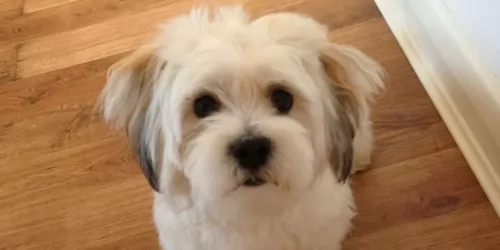 The Kyi-Leo is everything you want in a family companion – active, playful, loving, gentle, happy and balanced.
The Kyi-Leo is everything you want in a family companion – active, playful, loving, gentle, happy and balanced.
He loves his human family but tends to be a little bit wary around strangers, gradually warming to them.
He may be small, but he is robust and alert, and he is also capable of making you a good watchdog.
The Kyi-Leo is an all-round great little pet to have.
 The Toy Australian Shepherd is such a clever little dog and eager to learn too. You won’t have trouble getting him trained and socialized as he is eager to learn.
The Toy Australian Shepherd is such a clever little dog and eager to learn too. You won’t have trouble getting him trained and socialized as he is eager to learn.
He bonds closely with his human family, becoming a loyal, devoted pet. They are also great playmates for children. They’re the kind of dogs that will require mental and physical stimulation if they are to to be prevented from becoming bored and frustrated.
They need social interaction with their human family and will be devastated if they were to be stuck in the backyard and all but forgotten.
They have a lifespan of 12 – 14 years and you want to make sure they’re happy, contented years, because he is wiling to play his part and make you a wonderful pet and companion.
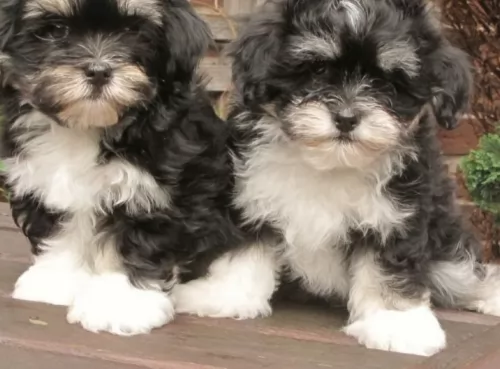 Your Kyi-Leo is such a feisty, robust little dog who is not likely to cost you much in terms of health care. With his frail legs, it is a good thing to know that you need to be careful with him in terms of back-and joint problems.
Your Kyi-Leo is such a feisty, robust little dog who is not likely to cost you much in terms of health care. With his frail legs, it is a good thing to know that you need to be careful with him in terms of back-and joint problems.
There are actually knee joint issues which are fairly common in small dogs, one of which is patellar luxation.
This is where the kneecap pops out of the thighbone, causing the dog to skip or hop. Some joint issues are genetic and may require surgery. Make sure to keep your pet’s weight under control to remove additional stress on the joints.
This is another dog illness you want to be careful with. Acute pancreatitis -inflammation - is when the condition comes on suddenly while chronic pancreatitis is when pancreatitis occurs over a period of time.
With acute pancreatitis in dogs you’ll see symptoms such as vomiting, abdominal pain, tremors and reluctance to eat. Pancreatitis can be brought on by too much fat, especially rancid fat, some anti-biotics, a low protein diet or a sickness such as diabetes.
If you suspect pancreatitis in your dog, get him as quickly as possible to the vet.
 Make sure your Toy Australian Shepherd sees the vet as a puppy to be dewormed and to get his first puppy injections.
Make sure your Toy Australian Shepherd sees the vet as a puppy to be dewormed and to get his first puppy injections.
Dental disease is far more serious than you think. It can affect other areas of your dog’s body. Plaque and inflamed gums lead to bone- and tooth loss.
Bad breath is a sign of periodontal disease. Find out from your vet what to do to guard against periodontitis. It’s important because ignoring bad teeth can lead to heart disease, with bacteria constantly entering the blood stream.
Fleas and ticks are your pet’s enemy as well as heartworm. Dogs can die from heartworm infestations. Heartworm is linked to mosquito bites, so if you live in warm areas, check with your vet for preventative measures.
This is another common dog illness to watch out for. This is a painful condition where the hip joint isn’t formed properly and it can lead to terrible pain and lameness.
Just like people endure endless misery with eczema, dogs too can develop skin allergies. They can create endless frustration and misery for any pet because of the terrible itch and pain. All the licking and scratching can lead to secondary bacterial infections too.
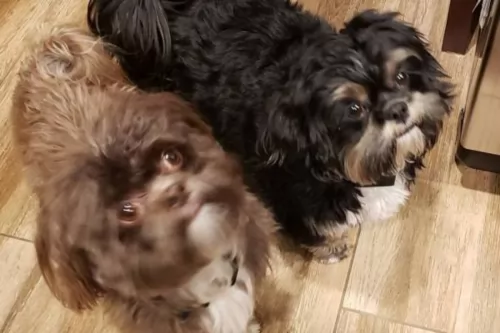 The Kyi-Leo doesn’t require vigorous exercising. One walk a day will keep them happy. There are pet owners who believe dogs can be permanently outside dogs where they can do their own exercise.
The Kyi-Leo doesn’t require vigorous exercising. One walk a day will keep them happy. There are pet owners who believe dogs can be permanently outside dogs where they can do their own exercise.
Everybody who knows dogs, knows they are social creatures who will simply lie at your backdoor just waiting for some response from their beloved human family. Every dog, regardless of breed or size, needs exercise and interaction with their humans every day.
Dogs left alone in the yard day after day are loney, frustrated and bored, and when they start digging or barking, irresponsible owners will ill treat them. These kind of people should never own a dog.
The Kyi-Leo has a sensitive stomach so he’ll need good quality food to avoid digestive problems. Ideally home-cooked food such as softly boiled chicken, brown rice and raw or cooked vegetables added into top quality kibble is the preferred diet.
Fresh, cool water needs to be constantly available.
Brush the long, silky coat at least twice a week to ensure it remains free of knotting. Brushing keeps the coat shiny too.
As a long eared dog, ears should be checked and cleaned regularly too. Air doesn’t reach the inside of their ears and the warm dampness in the ears are a breeding place for infection.
Nails should also be trimmed when they become long because left uncut they can hook onto things causing injury ad pain.
Small dogs are more prone to tartar formation and loss of teeth. You’ll notice that something isn’t right because your lively little dog will be lethargic, he may not want to eat his food and his face may be swollen. When you suspect dental problems, get him to the vet.
 Your puppy will need 4 small bowls of food a day. If you’re wondering just how much, either speak to your vet or follow the portion-guide on the packaging of the puppy dog food.
Your puppy will need 4 small bowls of food a day. If you’re wondering just how much, either speak to your vet or follow the portion-guide on the packaging of the puppy dog food.
As your puppy grows older, you feed less frequently so that he is getting two meals a day as an adult. For feeding an adult, there are excellent commercial dog foods available - remember to choose a good brand for your dogs age, size and energy levels.
Try and give him some tasty home-made food too from time to time – nothing exotic and spicy – just plain foods such as boiled chicken, brown rice, spinach, sweet potatoes and carrots. Dogs thrive on simple, healthy food like this. Make sure he always has a bowl of cool, fresh water to drink.
These energetic little bundles of fur will need regular exercise – every day in fact. He’s a smart little dog too, so you need to provide him with stimulating games that will keep his mind and his body physically fit.
Reduce shedding and loose hair by brushing the long hair a least twice a week. This will also help to get rid of matting. Trim nails and check for fleas and ticks.
Provide your Toy Australian with a warm, dry, peaceful place to sleep. If he is outside often, make sure he has both sun and shade to lie in as well as a sheltered spot for when it rains.